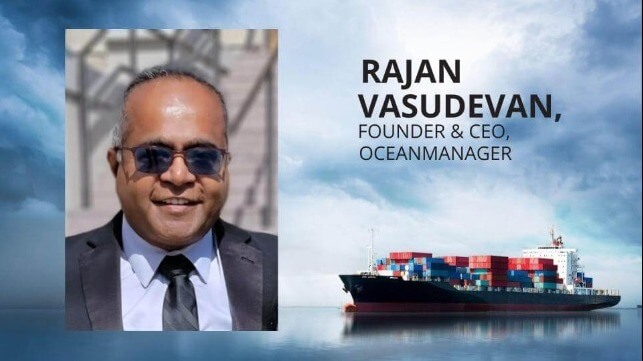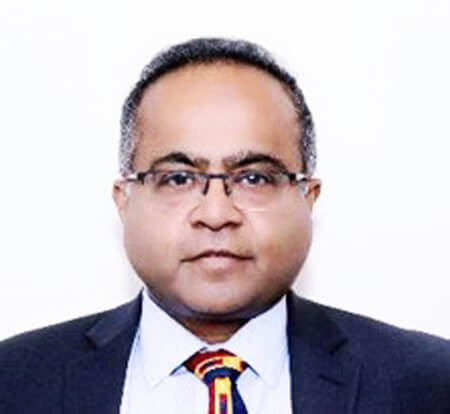Executive Achievement: Rajan Vasudevan, Founder & CEO, OceanManager

(Article originally published in July/Aug 2022 edition.)
 “Transforming Maritime Oceanwide” through digital solutions was entrepreneur Vasudevan’s ambitious vision in founding OceanManager eleven years ago. Today, the company’s products have been successfully installed on over 1,200 vessels and are helping lead maritime’s digital transformation.
“Transforming Maritime Oceanwide” through digital solutions was entrepreneur Vasudevan’s ambitious vision in founding OceanManager eleven years ago. Today, the company’s products have been successfully installed on over 1,200 vessels and are helping lead maritime’s digital transformation.
Tell us about yourself. Where are you from?
I am from India and grew up in a small town in North India. I am an engineering graduate of the Indian Institute of Technology in Delhi and came to the U.S. for my Master’s degree in engineering at Stanford University. I learned computer science along the way and worked with a number of startups in the Bay area before heading back to India to do my own startup. My career has been pretty much startups and entrepreneurial activity from the very beginning.
Okay, what did you do before founding OceanManager?
Prior to starting OceanManager in 2011, I founded Safaltek in 2003 – a company that provides software consulting and full-cycle software engineering services. In fact, OceanManager’s products are developed and supported by Safaltek.
What attracted you to the maritime industry?
As part of my consulting work I was involved with many niche industries like healthcare, real estate and insurance. Maritime is also a niche industry but a global one. When we started OceanManager in 2011, its appeal was the opportunity for transformation and digitalization. I had experienced a similar transformation in the U.S. healthcare industry and was excited about the opportunity to offer paperless solutions (digitalization) to the maritime market. We introduced some of the first Web-based solutions to an industry that was mostly desktop and paper-based.
What was your vision for the company?
OceanManager’s vision is to provide digital products for fleet management that streamline technical management and result in improved efficiency, lower costs and increased safety. The key to their success was they had to be simple to use and require minimal training. We were lucky to have Anglo-Eastern as anchor and to be guided by Captain Chawla to develop the first HSEQ product that put safety as priority.
Where is the company based?
OceanManager is headquartered in San Ramon, California and has network offices in Singapore, Dubai, India and Greece.
Who owns the company, and how is it managed?
The company is owned by me and managed through a leadership team with responsibility for operations (engineering, human resource and finance) and sales and marketing.
Why the name “OceanManager”?
Actually, we inherited the name and copyrights when the original product was purchased back in 2009. Initially, the product and the company had the same name, so we separated the company and named the various products differently, of which mHSEQ is our flagship product.
OceanManager describes itself as “a maritime consultancy and software solutions company.” What are some of its products and services?
Our products and services are targeted for ship managers and owners and offer enterprise solutions for all technical management operations including maintenance, procurement, crewing and safety. Our latest products have addressed the need for remote audits and inspections and digitized mooring operations.
How many customers has OceanManager served, and how many systems are in service?
OceanManager has served over 20 customers and 1,200 vessels. Currently we support 650 vessels.
“Transforming Maritime Oceanwide” is an ambitious goal. Tell us about it.
Our transformation initiative was to digitalize paper-based operations and replace the substantial administrative burden placed on vessel staff, who were struggling with increased paperwork and compliance duties. Our solutions allow seamless replication through easy-to-use, Web-based interface and use conventional emails systems on board. The technology needs of the industry have changed to data intelligence, interoperability and IoT, and business challenges have shifted to clean and operational integration upstream and downstream. That’s what we focus on.
How does OceanManager differentiate itself from other maritime software suppliers?
Our differentiation is strong operational support to ensure vessel staff are able to use the software and maintaining good quality data sets through all stages of the process. In addition, our solutions are very affordable both cost-wise and time-wise.
Tell us about the company’s various partnerships – with Evergas and STAG Marine and Pace Marine, for example. What’s the strategy behind these relationships?
Partnerships are key to our success in maintaining a lean business and operating globally. Our partnerships are both business-focused to promote products and implementation through consultants and technology-focused to improve product offerings through synergies. Partners increase our talent pool and contribute their spirit of entrepreneurship and knowledge of market needs.
Evergas, for example, is our client and collaborated with us to codevelop the software for our Mooring Management Plan. STAG Marine and Pace Marine are maritime consultants and subject matter experts. They help evaluate our products for clients and recommend improvements. We also continue to look for technical partners whose products and solutions can integrate with ours to provide a seamless experience to customers.
Why are software systems on a ship so important? How do they improve performance and enhance safety?
Software systems on board connect the crew on the vessel to shore and make collaboration easier while working the same information set. With improved connectivity and near real-time connectivity, the ship is a remote office or factory, and the crew are working remotely. We envision a time when it would be difficult to differentiate between shore and vessel with interchangeable command-and-control systems.
Shore-based information like weather and routing along with optimization performance computing help bridge the gap between cloud and edge computing. Better decisions are made in terms of optimizing costs and safety.
Can ships run on autopilot like an airplane or car? What is the future of unmanned or autonomous ships?
Vessel autonomy is the future and will be implemented in a wide spectrum wherein complex operations will involve humans while routine operations would be autonomous. The power of autonomy will also depend on integration with shore-based systems and vessel-to-vessel communication. Autopilot on vessels would be closer to an airplane than a car because a car has fixed lanes.
How has COVID affected business? What changes did you have to make in operations and procedures? Are things getting back to normal now?
COVID slowed down business decisions on systems as the priority changed to crew-related challenges. On the other hand, all businesses had to be virtual, and software like OceanManager allowed staff to work remotely. We are gradually getting back to normal and are pleased to announce the recent opening of a new branch office in Pune, India.
Sustainability and decarbonization are all the rage these days. Do software solutions like OceanManager’s products have a role to play here? Can they contribute to a greener, cleaner world?
Sustainability and decarbonization are the backbone of OceanManager’s vision and include products to go paperless, enhance vessel performance, improve safety and reduce incidents, streamline audits to increase compliance and save on operational costs. A cleaner and greener world through environmental compliance and the ability to work remotely with reduced travel are also part of the vision.
To do this, our software solutions create value from digital assets like machine learning, AI and intelligence from aggregated data sources to improve decision-making, vessel performance and efficiency. Our crewing software, for example, enhances training procedures and helps ensure fair compensation and compliance.
What’s your next big idea? We understand you are often inspired by your customers.
Our next big idea is to integrate upstream operations and embed the value of clean and green operations into the entire supply chain such that shippers and consumers can make the best choices for operators who are sustainable. It’s essentially a sustainability scorecard that enables better decisions.
What is your vision for OceanManager today? Where would you like to see it in, say, five years?
OceanManager’s vision is to be part of the innovation ecosystem and build a co-opetition with other providers. A marketplace of solutions and partners that interoperate.
Wow, big! What’s your biggest challenge in getting there?
Our biggest challenge is funding and industry partnerships to develop our innovative solutions.
Okay, let’s talk about you a little more. How would you describe your leadership style?
I am an engineer at heart and passionate about using technology to solve business problems. My operational style is a mix of democratic leadership and laissez-faire.
What’s a typical day like for you?
A typical day would be an open calendar with 15-minute weekly meetings with functional leads and engineers to review and brainstorm.
What excites you most about your job?
The job is closely aligned with my passion for technology and high ownership that makes me accountable.
What do you like to do in your spare time?
My spare time is spent with family and maintaining a health regime. I also enjoy sci-fi and gardening.
What have we missed? Any final message for our readers?

that matters most
Get the latest maritime news delivered to your inbox daily.
Maritime needs to look outside its own industry and participate in the supply chain cluster. It can move up several notches and be proactive and showcase the industry as the backbone of the supply chain. We need to lobby more and develop better support for the crew.
Jack O’Connell is Senior Editor of The Maritime Executive.
The opinions expressed herein are the author's and not necessarily those of The Maritime Executive.
